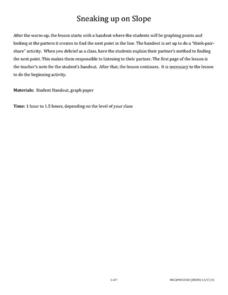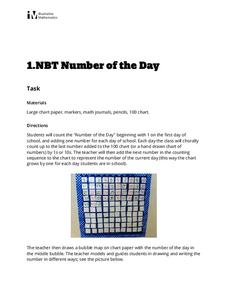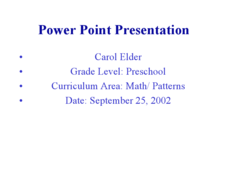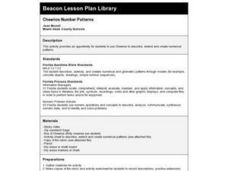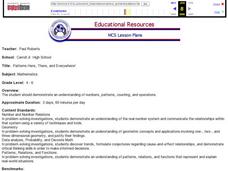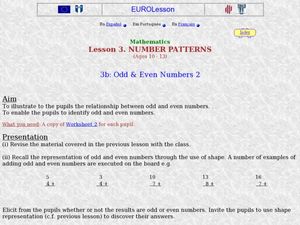Hawaiʻi State Department of Education
Rhythm Patterns
Fractions can be tricky. Why not have kids think of fractions like they think of eighth, quarter, and half notes? In teams, the class creates four-measure patterns with their percussion instruments. They need to explain their rhythm...
AGradeMath.com
Working With the 10,000 Chart
Calculate the answers to problems that are multiples of ten to help your class discern patterns in the zeros and learn to sequence. Each person receives a 10,000 chart, but s/he must discover that on their own through estimation and...
California Mathematics Project
Viral Marketing
Math's gone viral—in the form of an exponential function! The activity uses an exponential function to model the growth of a marketing strategy. Learners create a table of values to observe the pattern in the numbers and then model the...
EngageNY
Multiplying and Factoring Polynomial Expressions (part 2)
If you can multiply binomials, you can factor trinomials! This is the premise for a instructional activity on factoring. Pupils look for patterns in the binomials they multiply and apply them in reverse. Examples include leading...
West Contra Costa Unified School District
Sneaking Up on Slope
Pupils determine the pattern in collinear points in order to determine the next point in a sequence. Using the definition of slope, they practice using the slope formula, and finish the activity with three different ways to...
Willow Tree
Interior Angles, Exterior Angles, and Diagonals of Polygons
How does the number of sides of a polygon affect the angle measures? Learners recognize a pattern in finding the total measure of interior and exterior angles and the number of diagonals. They use the patterns to calculate...
Rational Number Project
Initial Fraction Ideas Lesson 18: Overview
Develop young mathematicians' ability to compare fractions with investigation into the number 1/2. After brainstorming a list of fractions equivalent to 1/2, children identify a pattern in the numerators and...
EngageNY
Special Lines in Triangles (part 1)
Allow your pupils to become the mathematicians! Individuals explore the properties of a midsegment of a triangle through construction and measurement. Once they figure out the properties, learners use them to draw conclusions.
EngageNY
Similarity and the Angle Bisector Theorem
Identifying and verifying reproducible patterns in mathematics is an essential skill. Mathematicians identify the relationship of sides when an angle is bisected in a triangle. Once the pupils determine the relationship, they prove it to...
EngageNY
Perimeter and Area of Triangles in the Cartesian Plane
Pupils figure out how to be resourceful when tasked with finding the area of a triangle knowing nothing but its endpoints. Beginning by exploring and decomposing a triangle, learners find the perimeter and area of a triangle. They...
Curated OER
Applied Science - Science and Math Lab
Students investigate topology. In this Applied Science lesson students explore higher, more abstract mathematics using tangles. Students make topologically related shapes.
Illustrative Mathematics
Number of the Day
Daily routines not only help to manage classrooms, they can also provide students with rich opportunities for learning. This activity supports young learners in developing their number sense by counting up the school days on a class...
Mathematics Assessment Project
Discovering the Pythagorean Theorem
Young mathematicians join the ancient order of the Pythagoreans by completing an assessment task that asks them to find the area of tilted squares on dot paper. They then look at patterns in the squares to develop the...
Curated OER
Math Review for Grade 1 (1.1)
For this math review for grade 1 (1.1) worksheet, 1st graders answer 25 multiple choice questions in a standardized test format reviewing skills of addition, patterns, and number order.
Curated OER
Math/Patterns: Preschool
Show this presentation to your preschoolers to boost their pattern recognition skills. Students must determine what comes next in each of the 9 slides. Each slide contains different numbers, letters, colors, or images to show that...
Curated OER
Patterns and Algebraic Expressions
Scholars will solve problems, create patterns, and write algebraic expressions. In addition, they will learn how to represent a number with a variable.
Curated OER
Number and Shape Patterns
Review what constitutes a pattern, and have the kids create number and shape patterns of their own. An activity page requires them to name and identify simple numerical patterns.
Curated OER
Eating Patterns
Students sort through pictures of food to create patterns as they pertain to geometry. In this geometric patterns lesson, students relate to food as concrete objects that represent geometric patterns. Students recognize and...
Curated OER
Cheerios Number Patterns
Young scholars, following a provided worksheet, use Cheerios to explore number patterns.
Curated OER
Math Series: Number Patterns
The focus of this math lesson plan is representing numbers in different ways. Young mathematicians practice putting numbers into sets, and arriving at answers in new ways. For example, they are asked to, "Show me how to get 7 eyes." A...
Curated OER
Patterns Here, There and Everywhere
Pattern recognition is a skill often used in mathematics. Learners count and sort manipulatives, organize the data into a graph and answer questions about the information displayed. They collect the objects to be used and create patterns...
Curated OER
Hungry Patterns
In this patterning worksheet, students examine 5 sets of clip art pictures of food. They circle the food choice that completes the pattern or shows which one comes next. They circle the food pictures at the bottom of the page that...
Curated OER
Number Patterns/ Odd and Even #2
What's odd? What's even? And what is the pattern? Learners explore addition problems to answer this question, deciding if the answer to each equation is odd or even. They then draw a two-column table to illustrate the outcomes of the...
Curated OER
Investigation - Patterns/Functions
Students will display the first five rows of Pascal's Triangle and discuss in their groups what patterns they see in the rows of numbers. They will give responses and discuss that these numbers form what is called Pascal's Triangle.
Other popular searches
- Growing Patterns in Math
- Number Patterns in Math
- Geometric Patterns in Math
- Pasta Patterns in Math
- Increasing Patterns in Math
- Patterns in Math Quiz
- Repeating Patterns in Math
- Color Patterns in Math
- Identifying Patterns in Math
- Nature's Patterns in Math




